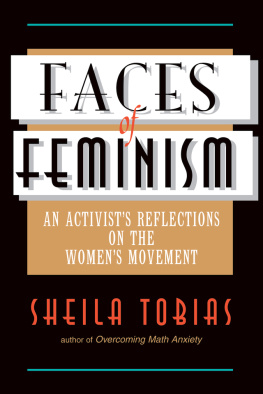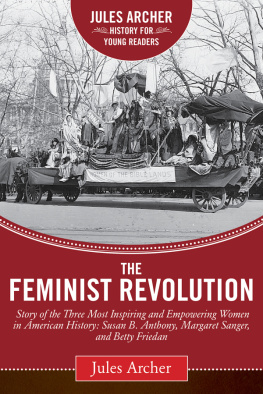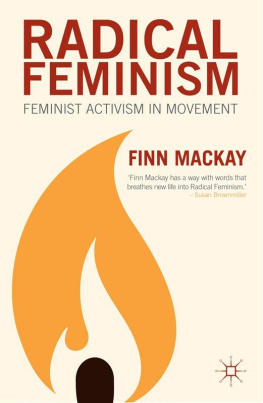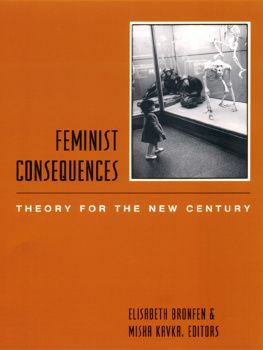Lynn S. Chancer - After the Rise and Stall of American Feminism: Taking Back a Revolution
Here you can read online Lynn S. Chancer - After the Rise and Stall of American Feminism: Taking Back a Revolution full text of the book (entire story) in english for free. Download pdf and epub, get meaning, cover and reviews about this ebook. year: 2019, publisher: Stanford University Press, genre: Politics. Description of the work, (preface) as well as reviews are available. Best literature library LitArk.com created for fans of good reading and offers a wide selection of genres:
Romance novel
Science fiction
Adventure
Detective
Science
History
Home and family
Prose
Art
Politics
Computer
Non-fiction
Religion
Business
Children
Humor
Choose a favorite category and find really read worthwhile books. Enjoy immersion in the world of imagination, feel the emotions of the characters or learn something new for yourself, make an fascinating discovery.

- Book:After the Rise and Stall of American Feminism: Taking Back a Revolution
- Author:
- Publisher:Stanford University Press
- Genre:
- Year:2019
- Rating:3 / 5
- Favourites:Add to favourites
- Your mark:
After the Rise and Stall of American Feminism: Taking Back a Revolution: summary, description and annotation
We offer to read an annotation, description, summary or preface (depends on what the author of the book "After the Rise and Stall of American Feminism: Taking Back a Revolution" wrote himself). If you haven't found the necessary information about the book — write in the comments, we will try to find it.
Publisher: Stanford University Press; 1 edition (February 26, 2019)
Language: English
ISBN-10: 0804774374
ISBN-13: 978-0804774376
It is more than fifty years since Betty Friedan diagnosed malaise among suburban housewives and the National Organization of Women was founded. Across the decades, the feminist movement brought about significant progress on workplace discrimination, reproductive rights, and sexual assault. Yet, the proverbial million-dollar question remains: why is there still so much to be done?
With this book, Lynn S. Chancer takes stock of the American feminist movement and engages with a new burst of feminist activism. She articulates four common causesadvancing political and economic equality, allowing intimate and sexual freedom, ending violence against women, and expanding the cultural representation of womenconsidering each in turn to assess what has been gained (or not). It is around these shared concerns, Chancer argues, that we can continue to build a vibrant and expansive feminist movement.
After the Rise and Stall of American Feminism takes the long view of the successes and shortcomings of feminism(s). Chancer articulates a broad agenda developed through advancing intersectional concerns about class, race, and sexuality. She advocates ways to reduce the divisiveness that too frequently emphasizes points of disagreement over shared aims. And she offers a vision of individual and social life that does not separate the personal from the political. Ultimately, this book is about not only redressing problems, but also reasserting a future for feminism and its enduring ability to change the world.
**
Review:
Lynn Chancers advice for completing the feminist revolution is sage, practical, and eminently useful. Feminists young and old will be reinvigorated by this call to battle. (Judith Lorber author of Breaking the Bowls: Degendering and Feminist Change**)
In this sweeping, unflinching account, After the Rise and Stall of American Feminism tackles the paradox of American feminism. Interrogating feminisms own thorny contradictions and challenges, Lynn Chancer offers women a bold and inspiring plan for claiming equality with menonce and for all. (Lisa Wade author of American Hookup: The New Culture of Sex on Campus**)
With her characteristic brilliance, Lynn Chancer charts the hard-won victories and persistent obstacles that have marked womens changing status since the rise of second wave feminism. After the Rise and Stall of American Feminism is a tour-de-force diagnosis of contemporary feminisms conundrums and a blueprint for feminists of all stripes to come together to achieve equality. (Kathleen Gerson author of The Unfinished Revolution: Coming of Age in a New Era of Gender, Work, and Family**)
After the Rise and Stall of American Feminism makes a compelling case for how feminists can find common ground from an intersectional perspective to organize for social justice. Impressive and timely, this is an indispensable resource for anyone interested in gender, social movements, and contemporary culture. (Isabel Pinedo, Hunter College CUNY)
Lynn Chancer, a lifelong feminist scholar, has the perspective necessary to help us understand where feminism is now, where it came from, and where it could go. Whether youre a newly-minted feminist or an old hand, this book is a fresh read on feminisms promise for full liberation as well as the roadblocks that could stop the revolution in its tracks. (Laurie Essig author of Love, Inc. Dating Apps, the Big White Wedding, and Chasing the Happily Neverafter**)
After the Rise and Stall of American Feminism is an engaging, well written, and accessible map of our feminist past, present, and future. This book should be required reading for everyone interested in gender justice and committed to the full human rights of all women and men. (France Winddance Twine coeditor of Feminisms and Antiracism: International Struggles for Justice**)
Lynn Chancer offers us an alternative to leaning in, one responsive to the needs of diverse groups of women and rooted in intersectional activism. Her insights are a welcome and revitalizing intervention, outlining a bold and practical way forward and a hopeful path toward big tent feminism. (Kerwin Kaye Wesleyan University)
Lynn Chancer illuminates the commonalities that connect feminists from across the movement. Anyone who has been marginalized because of any aspect of their beingincluding gender, sexuality, race, class, education, and beyondwill find solace and hope in this book. (Beverly-Xaviera Watkins NYU College of Global Public Health)
About the Author:
Lynn S. Chancer is Professor of Sociology at Hunter College and Executive Officer of the Ph.D. Program in Sociology at The Graduate Center, CUNY. She is the author of four books and numerous articles on everything from gender, race, and class to pornography, prostitution, and beauty.
Lynn S. Chancer: author's other books
Who wrote After the Rise and Stall of American Feminism: Taking Back a Revolution? Find out the surname, the name of the author of the book and a list of all author's works by series.






